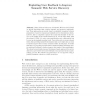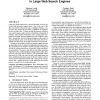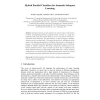238 search results - page 8 / 48 » Exploiting Hybrid Parallelism in Web Search Engines |
SEMWEB
2009
Springer
14 years 1 months ago
2009
Springer
State-of-the-art discovery of Semantic Web services is based on hybrid algorithms that combine semantic and syntactic matchmaking. These approaches are purely based on similarity m...
CIKM
2009
Springer
14 years 1 months ago
2009
Springer
Web search engines are often implemented as centralized systems. Designing and implementing a Web search engine in a distributed environment is a challenging engineering task that...
WWW
2005
ACM
14 years 8 months ago
2005
ACM
Large web search engines have to answer thousands of queries per second with interactive response times. Due to the sizes of the data sets involved, often in the range of multiple...
WWW
2007
ACM
14 years 8 months ago
2007
ACM
Semantic similarity measures play important roles in information retrieval and Natural Language Processing. Previous work in semantic web-related applications such as community mi...
ICANN
2011
Springer
12 years 10 months ago
2011
Springer
Subspace learning is very important in today's world of information overload. Distinguishing between categories within a subset of a large data repository such as the web and ...



